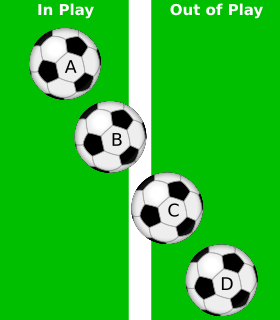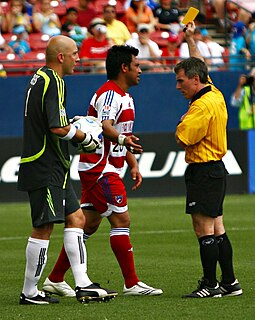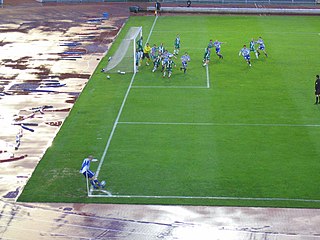This is a glossary of terms used in Canadian football. The Glossary of American football article also covers many terms that are also used in the Canadian version of the game.
- Legally positioned at the kick-off or the snap. On kick-offs, members of the kicking team must be behind the kick-off line; members of the receiving team must be at least 10 yards from the kick-off line. On scrimmages, at the snap the offence must be behind the line of scrimmage; the defence must be at least one yard beyond the line of scrimmage.
- A player of the kicking team who can legally recover the kick. The kicker himself and any teammates behind the ball at the time of the kick are onside. Thus on kick-offs all players of the kicking team are onside, but on other kicks usually only the kicker is. The holder on a place kick is not considered onside.
- A defensive position on scrimmages, also called free safety. Typical formations include a single safety, whose main duty is to cover wide receivers. See also defensive back.
- A two-point score. The defence scores a safety when the offence carries or passes the ball into its own goal area and then fails to run, pass, or kick the ball back into the field of play.

American and Canadian football are gridiron codes of football that are very similar. Both have their origins in rugby football. There are, however, some key differences.
In various sports, a professional foul is a deliberate act of foul play intended to bring about an advantage for the perpetrator's team. Professional fouls are usually committed to prevent an opponent from scoring.
In sports, a time-out or timeout is a halt in the play. This allows the coaches of either team to communicate with the team, e.g., to determine strategy or inspire morale, as well as to stop the game clock. Time-outs are usually called by coaches or players, although for some sports, TV timeouts are called to allow media to air commercial breaks. Teams usually call timeouts at strategically important points in the match, or to avoid the team being called for a delay of game-type violation, such as the five-second rule in basketball.
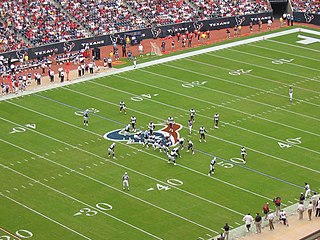
Game play in American football consists of a series of downs, individual plays of short duration, outside of which the ball is dead or not in play. These can be plays from scrimmage – passes, runs, punts, or field goal attempts – or free kicks such as kickoffs and fair catch kicks. Substitutions can be made between downs, which allows for a great deal of specialization as coaches choose the players best suited for each particular situation. During a play, each team should have no more than 11 players on the field, and each of them has specific tasks assigned for that specific play.
In gridiron football, clock management is the manipulation of a game clock and play clock to achieve a desired result, typically near the end of a match. It is analogous to "running out the clock" seen in many sports, and the act of trying to hasten the game's end is often referred to by this term. Clock managements strategies are a significant part of American football, where an elaborate set of rules dictates when the game clock stops between downs, and when it continues to run.

In the sport of association football, fouls and misconduct are acts committed by players which are deemed by the referee to be unfair and are subsequently penalized. An offense may be a foul, misconduct or both depending on the nature of the offence and the circumstances in which it occurs. Fouls and misconduct are addressed in Law 12 of the Laws of the Game.
In sports, running out the clock is the practice of a winning team allowing the clock to expire through a series of pre-selected plays, either to preserve a lead or hasten the end of a one-sided contest. Generally, it is the opposite strategy of running up the score. Most leagues take steps to prevent teams from doing this, with the most common measure being a time limit for completing a play, such as a play clock or shot clock.
A play clock, also called a delay-of-game timer, is a countdown clock intended to speed up the pace of the game, and hopefully the scoring, in American football and Canadian football. The offensive team must put the ball in play by either snapping the ball during a scrimmage down or kicking the ball during a free kick down before the time expires, or else they will be assessed a 5-yard delay of game or time count violation penalty. If a visible clock is not available or not functioning, game officials on the field will use a stopwatch or other similar device to enforce the rule.

In American football, a quarterback kneel, also called taking a knee, genuflect offense, or victory formation occurs when the quarterback immediately kneels to the ground, ending the play on contact, after receiving the snap. It is primarily used to run the clock down, either at the end of the first half or the game itself, in order to preserve a lead or a win. Although it generally results in a loss of a yard and uses up a down, it minimizes the risk of a fumble, which would give the other team a chance at recovering the ball.
The following terms are used in water polo. Rules below reflect the latest FINA Water Polo Rules.
Delay of game is an action in a sports game in which a player or team deliberately stalls the game, usually with the intention of using the delay to its advantage. In some sports, the delay of game is considered an infraction if it is longer than that permitted according to the game's rules, in which case a penalty can be issued. Some sports that have a delay of game penalty are American football, Canadian football, ice hockey and association football.
This list of rugby league terms is a general glossary of the terminology used in the sport of rugby league football. The sport has accrued a considerable amount of jargon to describe aspects of the game. Many terms originate from the Laws of the Game. A number of aspects of the game have more than one term that refers to them. Different terms have become popularly used to describe an aspect of the game in different places with notable differences between the northern and southern hemispheres.
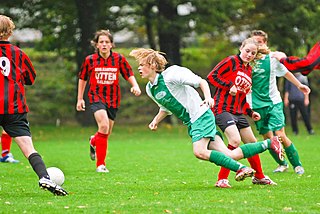
In sports, a foul is an inappropriate or unfair act by a player as deemed by a referee, usually violating the rules of a sport or game. A foul may be intentional or accidental, and often results in a penalty. Even though it may not be intentional fouling can still cause serious harm or injury to opposing players, or even their own players if unaware of their surroundings during particular situations on sports. Often own teammates can clash and foul each other by accident, such as both going for and with eyes on a ball in AFL. Strategical fouls violate the traditional norms of cooperation and agreement to the essential rules and regulations of the game, or are perhaps not part of the games at all.

In American football and Canadian football, a penalty is a sanction called against a team for a violation of the rules, called a foul. Officials initially signal penalties by tossing a bright yellow or orange colored penalty flag onto the field toward or at the spot of a foul. Many penalties result in moving the football toward the offending team's end zone, usually either 5, 10, or 15 yards, depending on the penalty. Most penalties against the defensive team also result in giving the offense an automatic first down, while a few penalties against the offensive team cause them to automatically lose a down. In some cases, depending on the spot of the foul, the ball is moved half the distance to the goal line rather than the usual number of yards, or the defense scores an automatic safety.
In gridiron football, replay review is a method of reviewing a play using cameras at various angles to determine the accuracy of the initial call of the officials. An instant replay can take place in the event of a close or otherwise controversial call, either at the request of a team's head coach or the officials themselves.
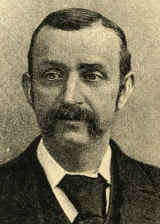
The rules of water polo are the rules and regulations which cover the play, procedure, equipment and officiating of water polo. These rules are similar throughout the world, although slight variations to the rules do occur regionally and depending on the governing body. Governing bodies of water polo include FINA, the international governing organisation for the rules; the NCAA rules, which govern the rules for collegiate matches in the United States; the NFHS rules which govern the rules in high schools in the USA and the IOC rules which govern the rules at Olympic events.

Futsal began in the 1930s in South America as a version of association football, taking elements of its parent game into an indoor format so players could still play during inclement weather. Over the years, both sports have developed, creating a situation where the two sports share common traits while also hosting various differences.

Tennis polo is a field sport where two teams of ten players use a tennis ball to score goals by throwing the ball into a goal defended by a keeper who holds a racquet. Tennis polo shares elements of sports such as field handball, the Gaelic sport of hurling, football, and lacrosse. The game may also be played where all field players have racquets including the goalkeeper.


